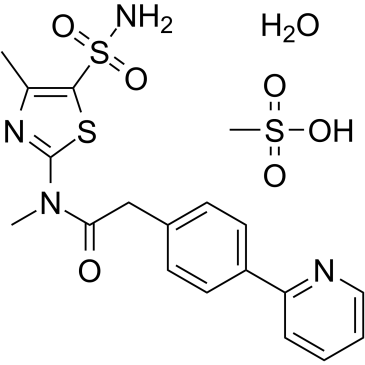Pritelivir mesylate hydrate
Modify Date: 2025-08-26 22:16:09

Pritelivir mesylate hydrate structure
|
Common Name | Pritelivir mesylate hydrate | ||
|---|---|---|---|---|
| CAS Number | 1428321-10-1 | Molecular Weight | 516.61 | |
| Density | N/A | Boiling Point | N/A | |
| Molecular Formula | C19H24N4O7S3 | Melting Point | N/A | |
| MSDS | N/A | Flash Point | N/A | |
Use of Pritelivir mesylate hydratePritelivir mesylate hydrate (BAY 57-1293 mesylate hydrate), an inhibitor of the viral helicase-primase complex, exhibits antiviral activity in vitro and in animal models of herpes simplex virus (HSV) infection. Pritelivir mesylate hydrate is active against herpes simplex virus types 1 and 2 (HSV-1 and HSV-2) with the IC50 of 0.02 μM against HSV1-2[1]. |
| Name | Pritelivir mesylate hydrate |
|---|
| Description | Pritelivir mesylate hydrate (BAY 57-1293 mesylate hydrate), an inhibitor of the viral helicase-primase complex, exhibits antiviral activity in vitro and in animal models of herpes simplex virus (HSV) infection. Pritelivir mesylate hydrate is active against herpes simplex virus types 1 and 2 (HSV-1 and HSV-2) with the IC50 of 0.02 μM against HSV1-2[1]. |
|---|---|
| Related Catalog | |
| Target |
IC50: 0.02 μM (HSV1-2)[1] |
| In Vivo | Pritelivir is the first in a class of antiviral agents that inhibit HSV replication by targeting the viral helicase–primase enzyme complex[2]. Pritelivir (0.03-45 mg/kg) significantly increases survival. Pritelivir (0.3-30 mg/kg) reduces mortality against HSV-1, E-377. Pritelivir has potent and resistance-breaking antiviral efficacy with potential for the treatment of potentially life-threatening HSV type 1 and 2 infections, including herpes simplex encephalitis[3]. Combination therapies of Pritelivir at 0.1 or 0.3 mg/kg/dose with Acyclovir (10 mg/kg/dose) are protective when compared to the vehicle treated group against HSV-2, strain MS[3]. Animal Model: Female BALB/c mice[3] Dosage: 0.03 to 45 mg/kg Administration: Administered orally, twice daily at approximately 12 h intervals, for 7 days Result: Survival was significantly increased to 80-100% as compared to the vehicle treatment. Even the lowest dose of 0.3 mg/kg was effective in increasing survival to 53%. |
| References |
| Molecular Formula | C19H24N4O7S3 |
|---|---|
| Molecular Weight | 516.61 |
| InChIKey | QPIDAZSAUYNBAC-UHFFFAOYSA-N |
| SMILES | CS(=O)(=O)O.Cc1nc(N(C)C(=O)Cc2ccc(-c3ccccn3)cc2)sc1S(N)(=O)=O.O |